Lehi takes his family into the wilderness by the Red Sea—They leave their property—Lehi offers a sacrifice to the Lord and teaches his sons to keep the commandments—Laman and Lemuel murmur against their father—Nephi is obedient and prays in faith; the Lord speaks to him, and he is chosen to rule over his brethren. [Between 600 and 592 B.C.]
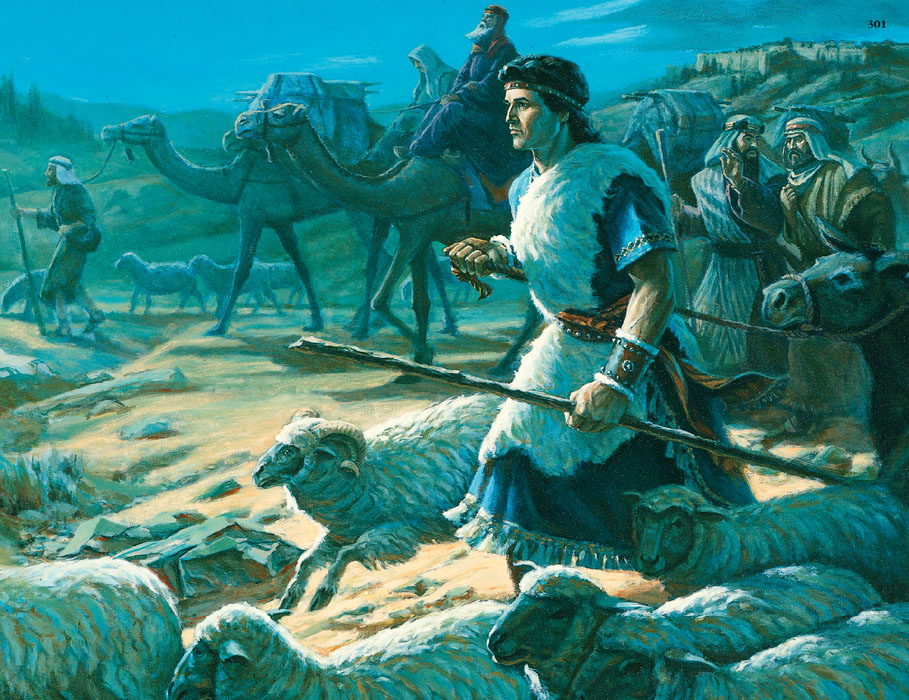
"진리를 가르침으로써 유대인을 화나게 한 선지자는 리하이 한 사람만이 아니었다. 예레미야 역시 이와 비슷한 시기에 박해를 받고 옥에 갇혔다. 니파이전서 2장에서 여러분은 주님이 리하이와 그의 가족을 성난 유대인에게서뿐 아니라 다가올 예루살렘의 멸망에서도 구하시기 위해 무엇을 하셨는지 읽을 것이다. 여러분은 리하이의 자녀들이 주님께서 리하이에게 하도록 명하신 일에 대해 다른 방식으로 반응했던 것에서 무엇을 배우는가." (몰몬경 학생 학습 지도서, 교회 교육 기구 편)
For behold, it came to pass that the Lord spake unto my father, yea, even in a dream, and said unto him: Blessed art thou Lehi, because of the things which thou hast done; and because thou hast been faithful and declared unto this people the things which I commanded thee, behold, they seek to take away thy life.
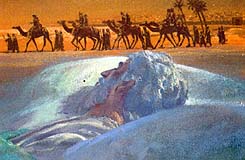
주) '네가 충실하여 ... 선포하였음으로 인하여' : "여기서 주님은 리하이가 예루살렘 주민들에게 복음을 전파하기 위해 희생한 것을 받아들이신다. 리하이가 말씀을 전파함에 충실한 뒤에야, 주님께서 그에게 그의 가족들과 함께 예루살렘을 떠나라는(이로 인해 그들이 보존된다)는 명령을 주신 것에 주목하라. 축복은 증거가 신앙의 시련 뒤에 오듯이 희생 뒤에 오게된다." (이더12:6)
주) '네가 복이 있나니' : 주님께서 명하신 대로 행한 리하이는, 당장은 백성들로부터 생명의 위협을 받을 정도로 어려웠지만, 결국 주님의 약속대로 '약속의 땅' 이라는 커다란 축복을 받았다. 주님의 축복은 멀지 않은 장래에 반드시 임하게 된다.
니파이전서 2:2~6 — 그 광야는 어디였는가? : "리하이는 그의 가족을 예루살렘에서 아콰바만 가까운 홍해로 이끌어갔다. 그 거리는 약 180마일(290킬로미터)이다. 그곳은 더운 불모지로서 준비되지 못한 여행자들을 덮치려고 기다리는 도둑들로 유명했다. 리하이는 홍해에 도달한 후 남쪽으로 방향을 바꿔서 삼 일 간을 더 여행하여 강의 계곡에 천막을 쳤다. 리하이의 가족들이 예루살렘 성에서 이 지점으로 오는 데는 14일 정도가 걸렸을 것이다. 예루살렘으로 돌아가는 여행에 관해 읽을 때 관련된 때와 거리를 염두에 둔다." (몰몬경 학생 학습 지도서, 교회 교육 기구 편)
주) 리하이의 여행 경로 : "리하이는 이곳에 있었는가? (데이비드 에이 에드워즈/교회잡지부, 리아호나 2008년 1월호) 한글
And it came to pass that he departed into the wilderness. And he left his house, and the land of his inheritance, and his gold, and his silver, and his precious things, and took nothing with him, save it were his family, and provisions, and tents, and departed into the wilderness.
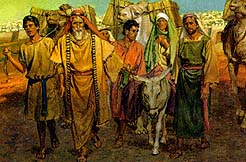
주) '버려두고' - 주님께서 명하신다면 과연 우리도 리하이처럼 모든 재산을 놓고 떠날 수 있는가? 문제는 주님께서 명하신 것이라는 것을 믿는 신앙에 달려있는 것 같다. 아마 오늘날 주님께서 리하이에게 명하신 것과 같은 방법(꿈)으로 명하신다면, 아마도 많은 자들이 그냥 한밤의 꿈 정도로 여길지도 모른다. 결정적인 순간에 행사할 수 없는 신앙은 헛된 신앙이리라. '다른 것은 다 따를 수 있지만 이것만은 안돼!' 라고 생각할 때 우리의 신앙은 한계점에 부딛히게 된다.
주) 그는 광야로 떠나되, 그의 집과 그의 기업의 땅과 그의 금과 그의 은과 그의 귀한 것들을 버려두고, : "이 구절은 리하이가 얼마나 부유했는지를 암시한다. 바벨론 사람들이 예루살렘을 포위했을 때, 그들은 확실하게 파괴하고 재물과 왕자들을 포로로 데려 갔다. "그(느부갓네살)가 또 예루살렘의 모든 백성과 모든 지도자와 모든 용사 만 명과 모든 장인과 대장장이를 사로잡아 가매 비천한 자 외에는 그 땅에 남은 자가 없었더라" (왕하24:14) 그렇지만 많은 재물이 남겨졌고 또 포획되었다. 이러한 사실은 리하이에게 알려졌다. "우리가 예루살렘에 머물렀더라면 ... 멸망했으리라" (니후1:4)
"리하이, 새라이아, 혹은 니파이가 세상의 부를 뒤에 남겨두어야 할 어떠한 문제를 지니고 있었다는 증거는 없다. 휴 니블리는 이렇게 기록했다. “that a wealthy citizen of Jerusalem should leave the land of his inheritance at a moment’s notice and with no more substantial incitement than a dream may seem at first blush highly improbable, to say the least. Yet Lehi had brooded long and anxiously over the fate of Jerusalem, praying ‘with all his heart, in behalf of his people.’ (1 Ne. 1:5) and when the dream came, he was prepared.” (Lehi in the Desert and the World of the Jaredites, p. 52) 11절에 기록된 것처럼 집을 떠나고 재산을 포기하는 생각은 레뮤엘과 레뮤엘을 걱정하게 했다."
그리고 그는 홍해 해안에 가까운 변경으로 따라 내려왔고, 홍해에 더 가까운 변경의 광야를 여행하였으며, 나의 모친 새라이아와, 나의 형들인 레이맨, 레뮤엘, 그리고 샘으로 구성된 가족과 함께 광야를 여행하였느니라.
Laman. The first son of Lehi. His name does not appear anywhere in the Bible. Obviously, it is very similar to the Biblical name of Laban but its meaning is unclear. Hugh Nibley writes:
“The only example of the name of Laman to be found anywhere to the writer's knowledge is its attribution to an ancient Mukam, or sacred place, in Palestine. Most of these Mukams are of unknown, and many of them of prehistoric, date. In Israel only the tribe of Manasseh built them. It is a striking coincidence that Conder saw in the name Leimun, as he renders it (the vowels must be supplied by guesswork), a possible corruption of the name Lemuel, thus bringing these two names, so closely associated in the Book of Mormon, into the most intimate relationship, and that in the one instance in which the name of Laman appears.” (Hugh Nibley, Lehi in the Desert and the World of the Jaredites, p. 45)
Nibley goes on to explain that Laman and Lemuel were Arabic names and that Nephi and Sam were Egytian names (see p. 46).
And he came down by the borders near the shore of the Red Sea; and he traveled in the wilderness in the borders which are nearer the Red Sea; and he did travel in the wilderness with his family, which consisted of my mother, Sariah, and my elder brothers, who were Laman, Lemuel, and Sam.
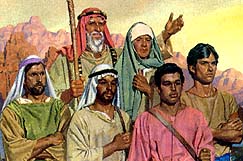
주) 새라이아 : Jeffrey Chadwick. “Sariah in the Elephantine Papyri.” JBMS 2:2, Fall 1993(영문).
주) 몰몬경의 여인들 : Camille Williams. " Women in the Book of Mormon." JBMS 11:1, ??(영문).
주) 새라이아와 니파이전서의 여인들 : Camille Fronk. " Desert Epiphany: Sariah & the Women in 1 Nephi." JBMS 9:2, ??(영문).
주) 샘: 정의롭고 거룩한 사람 : Ken Haubrock. “Sam: A Just and Holy Man.” JBMS 5:2, Fall 1996(영문).
주) 고대 히브리 비문으로 입증된 몰몬경의 이름들 : “Book of Mormon Names Attested in Ancient Hebrew Inscriptions.” JBMS 9:1 p 42-51(영문). This article was criticized by Thomas Finley, an Evangelical Old Testament scholar. Tvedtnes et. al responded in FRB 15:1, ??(영문).
주) 레이맨 : Alan K. Parrish. " Laman." EM, ??(영문).
니파이전서 2:5~10. 리하이가 예루살렘을 떠나 홍해 해안으로 여행하다
• 예루살렘에서 홍해까지 거리는 약 290킬로미터로, 고대에는 약탈자들이 자주 출몰하고 기온도 높은 불모지였다. 이러한 위험을 무릅쓰고 리하이 가족은 “사흘을 여행”했다.(니파이전서 2:5~6 참조) 즉, 그들이 예루살렘을 떠나 임시 거처를 마련했던 레뮤엘의 골짜기에 이르기까지는 적어도 12일에서 14일이 걸렸다는 뜻이다.
주) 홍해 해안에 가까운 변경 : "이스라엘의 자녀들이 40년 동안 방황한 곳인 시나이 반도의 서쪽 자락으로부터 분리된 홍해의 동쪽 자락에 위치한 아카바 만의 끝 가까이에 많은 것이 있었다. 옛날에 아카바는 고대 로마의 도로망에 의해 수에즈 및 카이로와 연결되었다. 회교 통치기간 동안에 그곳은 이슬람의 성지인 메카로 향하는 길목에서 순례자들이 항상 멈추는 중요한 장소였다." (Reynolds and Sjodahl, Commentary on the Book of Mormon, vol. 1, p. 25-26)
|
니파이 |
샘 |
레이맨과 레뮤엘 |
|
“훌륭하신 부모“ (니파이전서 1:1)를 인정함. |
광야로 가족을 따라감. (니파이전서 2:5 참조) |
부친께 대해 불평함. (니파이전서 2:11~12 참조) |
|
주님의 일에 마음을 둠.(2:16 참조) |
니파이의 말을 믿음. (2:17 참조) |
세상의 보화에 마음을 둠.(2:11 참조) |
|
반항적인 형들을 위해 기도함.(2:18 참조) |
니파이를 따라 예루살렘으로 감.(3:9 참조) |
샘과 니파이를 막대기로 때리고 학대함.(3:28; 7:16, 19 참조) |
|
판을 가져오라는 주님의 명에 신앙으로 응함.(3:7 참조) |
레이맨과 레뮤엘로부터 학대를 받음.(3:28~29 참조) |
주님의 명을“어려운 것”이라 하며 불평함.(3:5) |
|
계속 담대함.(3:15, 21; 7:8~15 참조) |
형제들과 함께 이스마엘의 가족을 데리러 예루살렘으로 돌아감.(7:2~5 참조) 반대를 견딤.(7:6 참조) |
쉽게 포기함.(3:14; 7:6~7 참조) |
|
형들이 충실하고 하나님만을 신뢰하도록 간곡히 권함.(3:15~21; 4:1; 7:8~21 참조) |
인간의 힘을 믿고 그것을 두려워함. (3:31 참조) |
|
|
영의 이끌림에 선뜻 응함.(4:5~18 참조) |
거역함으로써 커다란 영적인 축복을 부인함.(2:9~12 참조) |
|
|
학대 당한 것을 담백하게 용서함. (7:21 참조) |
겸손하게 되었다가 반항적이 되었다가 함.(2:9~10, 14; 7:19~20 참조) |
“The Borders of the Red Sea. Many have been near the head of the Gulf of Akabah, the eastern arm of the Red Sea, which is separated from the western arm by the Sinai Peninsula, where the children of Israel wandered for forty years. Anciently Akabah (or Aqaba) was connected with Suez and Cairo by means of a Roman road. During the Mohammedan reign it has always been an important stopping place for pilgrims on their way to Mekka, the holy city of Islam.
“Sariah. The wife of Lehi. The name is derived from the Babylonian, ‘Sarratu,’ which, in the city of Ur, where Abraham lived, was the title of a goddess, the consort of the moon god. In the language of Abraham, ‘Sarratu’ became ‘Sarai.’ (Gen. 11:28) Later when the Lord made a covenant with the Patriarch and changed his name from ‘Abram’ to ‘Abraham,’ his wife's name was changed from ‘Sarai’ to ‘Sarah.’ (Gen. 17:15) The name means ‘Princess.’ In the Book of Mormon the form of the name is somewhat different. I venture the suggestion that ‘Sariah’ is an abbreviation of ‘Sarah-Jah,’ and that means ‘Princess of the Lord’ (Jehovah)….
“…Lemuel. The second son of Lehi, probably named after Lemuel mentioned in Prov. 31:1, 4, who is supposed to be Solomon, the king. The name means either ‘Godward’ or ‘God is bright.’
“Sam. The third son of Lehi. The name is Egyptian. ‘It was the distinctive name of one of the highest orders of the priesthood. The great Rameses, himself, belonged to the order of Sam.’ (George Reynolds)” (Reynolds and Sjodahl, Commentary on the Book of Mormon, vol. 1, p. 25-26)
And it came to pass that when he had traveled three days in the wilderness, he pitched his tent in a valley by the side of a river of water.
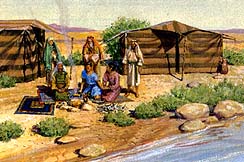
니파이전서 2:6~7. 번역된 책 : "몰몬경이 번역된 책이라는 두 개의 또다른 증거는 니파이전서 2장 6~7절에서 찾을 수 있다. 첫째, 세계의 많은 지역에서는 강이“물이 흐르는 강”(6절)이지만, 중동 지역에서는 일년 내내 물이 있는 강은 몇 안 된다. 겨울 동안에는 수천 개의 강(와디) 또는 마른 개울 바닥에 비가 내려 강이 된다. 비가 내리지 않는 시기에는 이러한 강(와디)은 물 흐르는 강이 되지 못한다. 둘째, 리하이가“돌 제단을”(7절) 쌓은 것은 출애굽기 20장 24~26절과 신명기 27장 5~6절에 있는 계명을 그대로 순종한 것이다."(몰몬경 학생교재 종교 121-122)
And it came to pass that he built an altar of stones, and made an offering unto the Lord, and gave thanks unto the Lord our God.
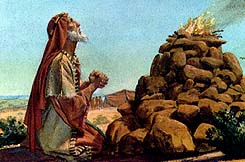
주) 리하이의 제단과 광야에서의 희생 : David R. Seely. “Lehi’s Altar and Sacrifice in the Wilderness.” JBMS 10:1, 2001(한글 및 영문).
주) 니파이인들 중 희생을 바칠 권능 : Anon. “Authority to Sacrifice among the Nephites” JBMS 8:1, 1999. p. 71(한글 및 영문).
주) 레위 제사장이 아닌 니파이는 무슨 권능으로 희생을 바쳤는가? : Paul Hoskisson. “By what authority did Lehi, a non-Levite priest, offer sacrifices?” Ensign, March 1994, p.54(한글 및 영문).
니파이전서 2:6~10. 주께 감사드리다
• 주님의 인도와 보호에 감사하는 리하이의 마음은 장막을 치자마자 가장 먼저 한 행동에서 드러난다. “그는 돌 제단을 쌓고 주께 제물을 드리며, 주 우리 하나님께 감사를 드렸느니라.”(니파이전서 2:7) 리하이의 이 행위는 몰몬경에서 그리스도를 충실히 따르는 사람들이 하나님께 감사를 드리기 위해 희생 제물과 번제를 드린 여러 사례 중 가장 먼저 있었던 일이다.(니파이전서 7:22; 모사이야서 2:3~4 참조)
리하이는 제물을 드린 후 곧바로 아들들에게 굳건하고 흔들림 없이 주님의 계명을 지켜야 한다고 가르쳤다. 누구든지 하나님의 자녀로서 그분을 기쁘게 해 드리고자 한다면 반드시 진심을 다해 감사를 드리고 순종해야 한다. 주님께서는 다음과 같이 가르치셨다. “그리고 만사에 하나님의 손길을 인정하지 아니하며, 그의 계명에 순종하지 아니하는 자들 외에는 사람이 어떠한 일로도 하나님께 죄를 범하거나 어느 누구에게도 그의 진노가 불붙지 아니하느니라.”(교성 59:21)
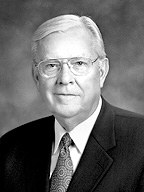 십이사도 정원회의 엠 러셀 밸라드 장로는 겸손과 감사로 가득 찬
기도를 드리라고 당부했다. “저는 사람들이 ‘주님께 이렇게 말씀드렸다’
혹은 ‘주님께 저렇게 말씀드렸다’ 하고 이야기하는 말을 자주 듣습니다.
주님께 ‘말하지’ 않도록 주의하십시오. 그 대신 하나님 아버지께 겸손하게
인도와 지시를 구하고 간청하십시오. 기도는 간절한 마음과 충만한 감사로
드려야 합니다.”(엠 러셀 밸라드, “Be Strong in the Lord, and in the Power of His
Might” [CES fireside for young adults, Mar. 3, 2002], 3, www.ldsces.org)
십이사도 정원회의 엠 러셀 밸라드 장로는 겸손과 감사로 가득 찬
기도를 드리라고 당부했다. “저는 사람들이 ‘주님께 이렇게 말씀드렸다’
혹은 ‘주님께 저렇게 말씀드렸다’ 하고 이야기하는 말을 자주 듣습니다.
주님께 ‘말하지’ 않도록 주의하십시오. 그 대신 하나님 아버지께 겸손하게
인도와 지시를 구하고 간청하십시오. 기도는 간절한 마음과 충만한 감사로
드려야 합니다.”(엠 러셀 밸라드, “Be Strong in the Lord, and in the Power of His
Might” [CES fireside for young adults, Mar. 3, 2002], 3, www.ldsces.org)
1 Ne 2:7 What priesthood did Lehi hold when he built an altar of stones, and made an offering?
Lehi was raised under the tradition of the Law of Moses. There is no reason to think that his sacrifice was anything but an animal sacrifice. The Book of Mormon rarely describes the practice of animal sacrifice. Mosiah 2:3 records, And they also took of the firstlings of their flocks, that they might offer sacrifice and burnt offerings according to the law of Moses. Although little is spoken of this practice, it would have been a consistent part of Nephite worship, especially in the temples that they built. The specific blessing the Lord promised with respect to this practice is found in Ex 20:24, I will come unto thee, and I will bless thee.
Secondly, in Lehi’s day, those who offered sacrifice in the temple of Solomon held the Aaronic Priesthood. In order to hold the Aaronic or Levitical priesthood, one had to be a Levite by descent. Lehi was a Manassehite, and therefore would not have held the Levitical priesthood. He must have held the Melchizedek priesthood. However, as with the great prophet Elijah, there is no record of how he received it. Alma suggests that these prophets received the priesthood from the Lord based on their faith, And this is the manner after which they were ordained--being called and prepared from the foundation of the world according to the foreknowledge of God, on account of their exceeding faith and good works; in the first place being left to choose good or evil; therefore they having chosen good, and exercising exceedingly great faith, are called with a holy calling, yea, with that holy calling which was prepared with, and according to, a preparatory redemption for such (Alma 13:3, italics added). Alma also makes it clear that the Melchizedek priesthood was held by the Nephites prior to the coming of Christ, Alma…confined himself wholly to the high priesthood of the holy order of God. (Alma 4:20, see also Alma 13:1-19)
And it came to pass that he called the name of the river, Laman, and it emptied into the Red Sea; and the valley was in the borders near the mouth thereof.
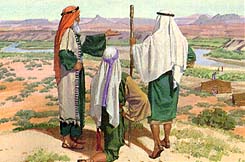
주) 8-13절 레이맨과 레뮤엘의 성격 : "니파이는 두 큰 아들에 대한 리하이의 염려를 이야기 한다. 니파이는 또한 그들의 불평의 원인을 언급한다. "그들이 불평한 것은 그들을 창조하신 그 하나님의 행하심을 그들이 알지 못하였기 때문이니라. 또한 ... 저 큰 성 예루살렘이 멸망될 수 있음도 믿지 않았기 때문이라." (12-13절) 만약 그들이 그들의 창조주의 행하심을 알았더라면, 그들은 홍수, 바벨탑, 소돔과 고모라, 주님께서 모세의 시대에 애굽인들에게 행하신 일, 앗수르에 의한 북 왕국 이스라엘의 멸망을 기억했을 것이다. 또 그들은 사람들의 죄악이 무르익을 때 주님께서 의로운 자들을 보호하시고 악한 자들을 멸하시는 패턴을 이해했을 것이다. 그리고 그들은 이러한 상황에서 의로운 자들에게 베푸시는 주님의 행하심과 주님의 명에 의하여 리하이가 예루살렘의 멸망 전에 그곳을 떠나도록 하신 것의 유사함을 알았을 것이다.
"예루살렘이 멸망되기에는 너무 큰 성이라는 레이맨과 레뮤엘의 믿음은 그들의 시야가 근시안적임을 보여준다. 시드기야가 왕이 될 때까지 예루살렘은 이미 그 세력과 독립의 일부를 잃기 시작했다. 리하이가 예루살렘을 떠나기 30년 전부터, 1) 유다 왕은 애굽왕 바로느고의 통제를 받았으며, 2) 유대인들은 애굽에 공물을 바치고 있었고, 3) 여호아하스(유다 왕)는 바로느고에 의해 투옥되었고, 4) 여호야김이 왕이었을 때, 주님은 예루살렘 성에 바벨론, 앗수르, 모압 및 암몬 족속의 군대를 보내셔서 부분적으로 성을 약탈하고 파괴하게 하셨으며, 5) 느부갓네살이 시드기야를 예루살렘에서 왕으로 세운 것처럼(왕하23-25장 참조) 바벨론 사람들은 이미 유대인인들위에 정치적인 우위를 확립하였다. 시드기야 치세 9년에 시드기야가 느부갓네살을 대항하여 거역한 것은 예루살렘의 최종적인 멸망을 가져왔다. 예루살렘이 정복할 수 없는 것이 아니라는 점을 리하이 시대의 정치적인 역학관계는 명백히 한다.
"레이맨과 레뮤엘은 영적 정치적으로 근시안적이었을 뿐만아니라, 그들의 간악함은 그들이 그처럼 흉악한 마음을 지녔다는 것이다. 그들은 리하이에 이어 후에는 니파이까지 죽일 것을 고려했었다. 그들의 관심은 항상 세속적인 것이었다. 레이놀드와 쇼달은 이렇게 기록했다. "반항적인 아들들의 성격에 주목하십시오. 그들의 완고함(그들은 "완고한 자들" 이었다 11절), 그들의 돈을 사랑함(그들은 뒤에 남겨두고 온 재물을 아쉬워했다. 11절), 그들의 신앙 결핍(그들은 그들이 광야에서 죽을것이라고 확신했다. 11절), 그들의 무지(그들은 하나님의 행하심을 알지 못했다. 12절, 그리고 그들은 선지자인 부친의 말씀을 거역했다. 13절), 최종적으로, 주님의 영의 나타나심 앞에서의 그들의 연약한 모습 (14절)을 주목하십시오." (Reynolds and Sjodahl, Commentary on the Book of Mormon, vol. 1, p. 27)
주) '의의 근원' : 레이맨인과 관련하여 축복의 말씀이 제일 먼저 나온 것은 오늘날 중 남미 대륙의 레이맨인의 번성과 관련할 때, 니파이의 기록의 우연의 일치가 아니라 주님의 배려였을 것이다. 몰몬경 후반부의 레이맨인들의 의로움과 비교해 보라.
And he also spake unto Lemuel: O that thou mightest be like unto this valley, firm and steadfast, and immovable in keeping the commandments of the Lord!
주) 레뮤엘 골짜기라 할 만한 아라비아의 새로운 후보지 : George D. Potter “A New Candidate in Arabia for the Valley of Lemuel.” JBMS 8:1, 1999. p 54-63(영문).Now this he spake because of the stiffneckedness of Laman and Lemuel; for behold they did murmur in many things against their father, because he was a visionary man, and had led them out of the land of Jerusalem, to leave the land of their inheritance, and their gold, and their silver, and their precious things, to perish in the wilderness. And this they said he had done because of the foolish imaginations of his heart.
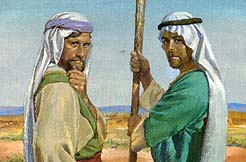
주) 환상을 보는 사람 : John A. Tvedtnes. " A Visionary Man." JBMS 6:2, ??(영문).
주) 이 말을 그가 하신 것은 레이맨과 레뮤엘의 완고함 때문이었더라. : "'목(neck)'은 정신 및 국가와 사람의 태도의 표징이며, 대체로 무감각과 뻔뻔스러움을 상징한다. (니후6:10, 잠29:1) "무쇠 힘줄" (니전20:4)로 된 목을 지닌 사람 혹은 "목이 뻣뻣한" (니후25:12, 니전2:11) 사람은 자기 이웃의 필요사항을 향해 고개를 돌리거나, 자신의 창조주를 향해 고개를 치켜들 수 없는 사람이다."
니파이전서 2:11~24. 레이맨과 레뮤엘 : "니파이가 그의 형들에 관해 기술한 것은 하나의 진지한 고발장이며, 레이맨과 레뮤엘이 얼마나 완악했는가를 단적으로 보여 준다. 리하이의 영적 능력을(니파이전서 2:14 참조) 살피고, 니파이의 위대성의 원천이 되고 관건이 되는 것을(16, 19~20, 22절 참조) 살핀다.
"20~24절에서는 약속의 땅에 도착한 리하이 일행을 주님께서 어떤 원리로 다스리셨는가를 발견할 수 있다. 주님께서 왜 반항적인 형들을 그들의 부친과 함께 약속의 땅으로 가게 하셨는가를 이해하는 데 도움을 주기 위해 이 절들에는 무엇이라고 적혀 있는가?" (몰몬경 학생교재 종교 121-122)
주) '환상을 보는 사람' - 레이맨과 레뮤앨은 신앙의 눈으로 부친의 결정을 바라볼 준비가 되지 않았다. (앨32:40) "또 이러므로 너희가 신앙의 눈으로 그 열매를 고대하며, 말씀을 가꾸지 아니할진대, 너희는 결코 생명나무의 열매를 딸 수 없느니라."
주) "환상을 보는 사람"은 어떤 사람인가? : "리하이는 하나님으로부터 시현과 꿈과 다른 계시들을 받았기 때문에 환상을 보는 사람이라고 불렸다. 대부분의 사람들은 이를 훌륭한 사람으로 여기겠지만 레이맨과 레뮤엘은 리하이를 비현실적인 공상가로 묘사하기 위해 그 말을 사용했다." (몰몬경 학생 학습 지도서, 교회 교육 기구 편)
이같이 레이맨과 레뮤엘은 연장자들이면서도, 참으로 그들의 부친을 거스려 불평하였나니, 그들이 불평한 것은 그들을 창조하신 그 하나님의 행하심을 그들이 알지 못하였기 때문이니라.
Marvin J. Ashton
“Be free of criticism and murmuring. Build and lift in your words and conversations as you sustain and support. Murmuring and criticism lead to inactivity and apostasy from the Church. Do not allow yourself the dangerous luxury of criticism and murmuring. When I think of those who are prone to murmur, I think of Laman and Lemuel. ‘And thus Laman and Lemuel, being the eldest, did murmur against their father. And they did murmur because they knew not the dealings of that God who had created them.’ (1 Ne. 2:121 Ne. 2:12.) Often murmuring is an outward evidence of disobedience.” (Ye Are My Friends, p. 3 - 4.)
And thus Laman and Lemuel, being the eldest, did murmur against their father. And they did murmur because they knew not the dealings of that God who had created them.
주) 그들이 불평한 것은 그들을 창조하신 그 하나님의 행하심을 그들이 알지 못하였기 때문이니라. : 불평에 관한 사도(맥스웰, 애쉬튼)들의 말씀 (영문)
주) 불평 : 영적인 일에 대한 무지와 하나님의 종에 대한 불신이 불평의 원인이리라.
Neal A. Maxwell
“Enduring ‘well’ means passing the breaking point without breaking, having cause to be bitter—as men measure cause—without being bitter. Enduring ‘well’ means the disciple in the very trough of his difficulties avoids, as Job wisely did, having ‘charged God foolishly.’ The ‘murmuring’ so often mentioned in the Book of Mormon is kindred to the feelings we may sometimes have when we do not really question God's existence but rather his fair play, and we wrongly begin to make demands of him. ("Hel. 16:17"Hel. 16:18"Hel. 16:19"Hel. 16:20Helaman 16:17-20.) Murmuring may have no single cause, but a lack of perspective is suggested: ‘They did murmur because they knew not the dealings of that God who had created them.’ ("1 Ne. 2:121 Nephi 2:12.) A brighter time will come when they that murmured ‘shall learn doctrine,’ (Isa 29:24) suggesting that conceptual inadequacy can cause us to murmur and complain.” (A Time to Choose, p. 42)
니파이전서 2:11~15. 불평
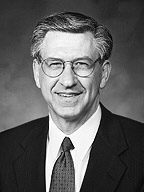 • 사탄이 우리에게 불평하도록 부추기는 한 가지 이유는 살아 있는
선지자들과 영감 받은 지도자와 부모님을 따르지 못하게 하려는 데 있다.
칠십인인 에이치 로스 워크먼 장로의 가르침에 따르면 “불평에는 세
단계가 있으며, 각 단계는 다음 단계로 이어져 불평하는 사람은 불순종이라는
길로 서서히 추락해” 나간다.
• 사탄이 우리에게 불평하도록 부추기는 한 가지 이유는 살아 있는
선지자들과 영감 받은 지도자와 부모님을 따르지 못하게 하려는 데 있다.
칠십인인 에이치 로스 워크먼 장로의 가르침에 따르면 “불평에는 세
단계가 있으며, 각 단계는 다음 단계로 이어져 불평하는 사람은 불순종이라는
길로 서서히 추락해” 나간다.
첫째, 불평할 때 사람은 의심하기 시작한다. “먼저 자기 마음에 의심을 품고 그 다음에는 다른 사람의 마음속에 의심을 옮겨” 심는다.
둘째, 불평하는 사람은 “가르침 받은 대로 하지 않으려고 자신을 합리화하고 변명하기 시작[한다.] …… 그렇게 그들은 불순종하는 핑계를 [늘어놓는다.]” 핑계를 대다 보면
세 번째 단계인 “계명 지키기를 게을리하는 나태한 상태”에 이르고 만다.
워크먼 장로는 이렇게 설명했다. “주님께서는 우리 시대에 이러한 태도에 대해 경고하셨습니다. ‘그러나 명령을 받기까지는 아무 일도 하지 않다가, 의심하는 마음으로 명령을 받고 그것을 게을리 지키는 자, 그는 정죄를 받느니라.’(교성 58:29) ……
살아 있는 선지자들이 주신 계명 가운데 여러분이 가장 힘들다고 생각하는 계명에 초점을 맞추시기 바랍니다. 그 계명이 자신에게 적용되는 것인지 아닌지 의문이 생기십니까? 지금 왜 그 계명에 따를 수 없는지 재빨리 핑계가 떠오르십니까? 그 계명을 상기시켜주는 사람들이 불만스럽고 불편하십니까? 그 계명을 지키기를 게을리하십니까? 사탄의 기만을 주의하십시오. 불평을 주의하십시오.”(에이치 로스 워크먼, 리아호나, 2002년 1월호, 99~100쪽)
Neal A. Maxwell
“Instead of gladness, murmuring seems to come so naturally to the natural man. It crosses the spectrum of complaints. We need bread. We need water. (See Num. 21:5Num. 21:5.) The needed military reinforcements did not arrive (see Alma 60:1Alma 60). ‘Why did we ever leave Egypt?’ (See Num. 11:20Num. 11:20.) ‘Why did we ever leave Jerusalem?’ (See 1 Ne. 2:111 Ne. 2:11.) On and on goes our murmuring, and, it is significant that it almost always focuses on our tactical frustrations…Like Laman and Lemuel, we too sometimes fail to understand the dealings of our God in our lives and in our times. (See also 1 Ne. 17:221 Ne. 17:22.)
“Too many of us seem to expect that life will flow ever smoothly, featuring an unbroken chain of green lights with empty parking places just in front of our destinations.
“In its extremity, despair not only reflects immediate discontentment but also incorporates feelings of very deep ambivalence and/or confusion about the nature of life: ‘Their sorrowing was . . . the sorrowing of the damned, because [they could not] take happiness in sin’ (Morm. 2:13Morm. 2:13, Morm. 2:14 14).
“By knowing that the everlasting and ultimate things are firmly in place, can we not then better endure irritations such as a dislocated travel schedule? Besides, how can it rain on the just and the unjust alike without occasionally raining on our personal parades? (See Matt. 5:45Matt. 5:45.)
“Knowing who we are surely helps, along with knowing about the ‘dealings’ of God with His children (1 Ne. 2:121 Ne. 2:12; 1 Ne. 17:22 17:22).” (One More Strain of Praise, p. 26.)
Neither did they believe that Jerusalem, that great city, could be destroyed according to the words of the prophets. And they were like unto the Jews who were at Jerusalem, who sought to take away the life of my father.
주) 구약 시대의 유대인들은 예루살렘이 멸망될 수 있음을 왜 믿지 않았는가? : Fred Woods. “Why didn’t Jews in Old Testament times believe Jerusalem could be destroyed?” Ensign, Dec. 1995, p. 52-53(영문).
주) '부친의 목숨을 빼앗으려 함' - (니전17:44) "그리하여 주께서 나의 부친에게 광야로 떠나라고 명하셨거니와, 유대인들 또한 그의 생명을 빼앗으려 하였고 그뿐 아니라 당신들도 그의 생명을 빼앗으려 하였나니, 그런즉 당신들은 마음에 살인한 자들이며 당신들은 그들과 같나이다."
주) '그들의 몸이 참으로 그 앞에서 떨었으며' : "레이맨과 레뮤엘은 영의 권세에 의한 많은 표적을 경험한다. 리하이에 의한 이 당황스러운 경험이 첫 번째이다. 후에 그들은 1) 주님의 천사를 보았고, 2) 니파이가 성령에 충만했을 때 그에 의해 다시 한번 당황하였고, 3) 리아호나에 의해 대양을 건너도록 인도받았고, 4) 리아호나는 그들이 의로울 때에만 작동한다는 증거를 받았다. (니전3:29, 니전17:52-54, 니전18:12-22) 그럼에도 불구하고 그들은 진리를 거역했다."
주) '권능을 가지고 말씀함'- 사람을 설득하여 행동을 바꾸게 할 수 있는 유일한 권세는 두가지 인데, 하나는 거짓없는 사랑이고, 다른 하나는 영의 권세, 즉 성신의 능력이 함께 하는 말씀이다. (교성121:43) "성신에 감동되었을 때에는 제 때에 날카롭게 꾸짖을 것이나, 그 후에는 네가 꾸짖은 자에게 더 큰 사랑을 나타내 보여, 그가 너를 자기 원수로 여기지 않게 하라."
And my father dwelt in a tent.
주) '나의 부친은 장막에 거하였느니라' : 이 구절은 몰몬경에서 가장 짧은 구절이다. 이는 거의 나타나지 않는 의미를 포함하고 있을 수 있다. 한편 휴 니블리는 이렇게 기록했다. Hugh Nibley (영문):
1 Ne 2:15 And my father dwelt in a tent
This is the shortest verse in the Book of Mormon. It may seem to carry little meaning. However, Hugh Nibley writes:
“The editors of the Book of Mormon have given a whole verse to Nephi's laconic statement, ‘And my father dwelt in a tent’ (1 Nephi 2:15), and rightly so, since Nephi himself finds the fact very significant and refers constantly to his father's tent as the center of his universe. To an Arab, ‘My father dwelt in a tent’ says everything. ‘The present inhabitants of Palestine,’ writes Canaan, ‘like their forefathers, are of two classes: dwellers in villages and cities, and the Bedouin [tent-dwellers]. As the life and habits of the one class differ from those of the other, so do their houses differ. Houses in villages are built of durable material; . . . on the other hand, Bedouin dwellings, tents, are more fitted for nomadic life…’”
“So with the announcement that his ‘father dwelt in a tent,’ Nephi serves notice that he had assumed the desert way of life, as perforce he must for his journey: any easterner would appreciate the significance and importance of the statement, which to us seems almost trivial. If Nephi seems to think of his father’s tent as the hub of everything, he is simply expressing the view of any normal Bedouin, to whom the tent of the sheikh is the sheet anchor of existence.” (Lehi in the Desert and the World of the Jaredites, pp. 57-58)
And it came to pass that I, Nephi, being exceedingly young, nevertheless being large in stature, and also having great desires to know of the mysteries of God, wherefore, I did cry unto the Lord; and behold he did visit me, and did soften my heart that I did believe all the words which had been spoken by my father; wherefore, I did not rebel against him like unto my brothers.
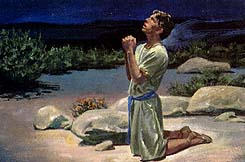
주) '내가 주께 부르짖었더니, 보라, 그가 나를 찾아오사 나의 마음을 부드럽게 하셨으므로' (영문)
니파이전서 2:16
니파이가 불평을 하지는 않았지만 예루살렘을 떠나는 일이 쉽지만은 않았을 것이라는 증거를 이 구절 어느 부분에서 찾을 수 있는가?
주) '하나님의 비밀을 알고자 심히 원하였던지라' : "니파이의 열망의 중요성은 간과될 수 없다. 니파이는 주님께 간청을 드려 성공할 수 있었는데 이는 그의 큰 신앙(19절)과 열망 때문이었다. 주님께서는 사람들에게 그들의 원대로(앨29:4) 내어 주신다. 이 구절의 또 다른 중요한 교훈은 니파이가 맹목적인 신앙으로 그의 부친을 따른 것이 아니라는 것이다. 그는 주님께 도움을 구했으며 이는 그의 마음을 부드럽게 하기 위해 필요한 일이었다. 이와같이, 그는 그 자신 스스로 증거를 얻었으며 이는 그로 하여금 그의 형들처럼 거역하지 않도록 해주었다. 우리도 거역하려는 마음이 들 때, 니파이의 모범에 따라 우리의 마음을 부드럽게 해 주시도록 주님께 간구해야 한다."
"몰몬경의 위대한 저자들은 모두 그들의 어린 나이에 부름을 받았다. 이 구절에서 니파이는 그가 여호와로부터 개인적인 방문을 받았음을 시사하고 있다. 이 위대한 축복은 또한 야곱, 몰몬, 추측하건대 모로나이도 받았다. 리하이는 야곱에게 이와같이 말했다, '너는 네 젊었을 때에 그의 영광을 보았나니, 그런즉 너는 그가 육체로 성역을 베푸실 자들처럼 복되도다'(니후2:4). 몰몬은 '나이가 열다섯 살이 되었을 때 ... 주의 방문을 받았고, 예수의 선하심을 맛보아 알게 되었느니라'(몰몬1:15, 모로8:2참조). 이러한 관점에서 보면, 몰몬경의 저자들은 14살의 나이에 '예수의 선하심을 맛보아 알게된' 몰몬경의 번역자인 조셉 스미스와 같다고 할 수 있다." (영문에 M 러셀 밸라드 장로 말씀 포함)
M. Russell Ballard
“Vision makes all the difference in the world. Why was Nephi's reaction to his father's willingness to follow the Lord's direction and lead his family into the wilderness so different from that of his elder brothers, Laman and Lemuel? Could it be because Nephi went to the Lord privately and asked for his own witness or vision of the Lord's directive to his father? ‘And it came to pass that I, Nephi, being exceedingly young, nevertheless being large in stature, and also having great desires to know of the mysteries of God, wherefore, I did cry unto the Lord; and behold he did visit me, and did soften my heart that I did believe all the words which had been spoken by my father; wherefore, I did not rebel against him like unto my brothers’ ("1 Ne. 2:161 Nephi 2:16). Nephi sought his own vision, and the result was that his heart was softened. He had a clearer view of where his family was headed, and he was able to commit to follow the Lord. As Solomon explained, ‘Where there is no vision, the people perish’ ("Prov. 29:18Proverbs 29:18).” (Counseling with Our Councils: Learning to Minister Together in the Church and in the Family, p. 23.)
주) '어렸으나 체격은 컸음' - (몰2:1) "또 이렇게 되었나니 그 같은 해에 니파이인들과 레이맨인들 사이에 다시 전쟁이 시작되매, 내가 어렸음에도 불구하고 체격이 컸던지라, 그러므로 니파이 백성들이 나를 임명하여 그들의 지도자, 곧 그들 군대의 지휘관이 되게 하였더라." 니파이가 선택된 것이나 몰몬이 선택된 것은 체구가 아니라 주님께 의지하는 능력 때문이다.
주) '찾아오사' - (니전2:16) "보라, 그가 나를 찾아오사" (behold he did visit me), (이노1:10) "나는 너의 형제들이 얼마나 부지런히 나의 계명을 지키는가에 따라 그들을 찾아겠노라." (I will visit thy brethren), (모사27:7) "주께서 그들을 돌아보시고 그들을 번성하게 하시매" (And the Lord did visit them), (앨17:10) "주께서 그의 영으로 그들을 돌아보시고, 그들에게 이르시되" (the Lord did visit them), (앨58:11) "주 우리의 하나님께서 우리를 돌아보시고 그가 우리를 구하시리라는 확신을 주셨나니" (the Lord our God did visit us) (몰1:15) "그리고 나는 나이가 열다섯 살이 되었을 때 성품이 진지하였던지라, 주의 방문을 받았고, 예수의 선하심을 맛보아 알게 되었느니라."
And I spake unto Sam, making known unto him the things which the Lord had manifested unto me by his Holy Spirit. And it came to pass that he believed in my words.
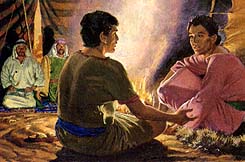
주) '성령으로 내게 나타내 주신 것들' - (앨5:46) "보라, 내가 너희에게 이르노니 하나님의 성령으로 그것들이 내게 알려졌느니라. 보라, 내가 여러 날을 금식하고 기도하며 나 스스로 이러한 일을 알고자 하였느니라. 이제 내가 참으로 그러한 것이 참된 줄을 스스로 아는 것은, 주 하나님께서 그의 성령으로 그것들을 내게 나타내 주셨음이니, 이는 내 안에 있는 계시의 영이니라."
And it came to pass that the Lord spake unto me, saying: Blessed art thou, Nephi, because of thy faith, for thou hast sought me diligently, with lowliness of heart.
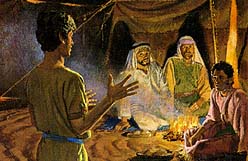
주) '네가 복이 있나니' : 니파이의 축복의 여정은 다른 사람들을 위한 기도와 하나님의 신비를 알고자하는 기도로 인해 시작 되었다.
And inasmuch as ye shall keep my commandments, ye shall prosper, and shall be led to a land of promise; yea, even a land which I have prepared for you; yea, a land which is choice above all other lands.
주) 너희가 나의 계명을 지킬진대, 너희는 번성할 것이요: 약속의 땅의로서의 미대륙(America)에 대한 스펜서 W 킴볼 회장의 말씀 (영문) :
주) '약속의 땅' - 하나님께서 니파이를 위해 '약속의 땅을 마련해 주겠다'고 하신 약속은 오늘날의 우리들도 합당하다면 동일하게 주어질 수 있는 축복일 것이다. 우리가 도달 할 약속의 땅이 어떤 형태로 우리에게 다가오게 될 것인가? 그곳은 어디인가?
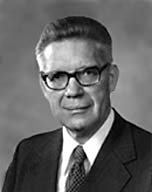 “순종은 하늘의 첫번째 율법입니다. 영원하신 분의 율법에 따라 생활하는 사람들에게는 최고의 진보와 최고의 온전함과 최고의 구원과 최고의 경건함과, 의롭고 공정하며 참된, 그리고 훌륭한 모든 것이 주어질 것입니다. 영원을 통틀어서 하나님의 계명을 지키는 것보다 더 중요한 것은 없습니다.” (브르스 알 맥콩키, 약속된 메시야: 그리스도의 강림[1978년], 126쪽)
“순종은 하늘의 첫번째 율법입니다. 영원하신 분의 율법에 따라 생활하는 사람들에게는 최고의 진보와 최고의 온전함과 최고의 구원과 최고의 경건함과, 의롭고 공정하며 참된, 그리고 훌륭한 모든 것이 주어질 것입니다. 영원을 통틀어서 하나님의 계명을 지키는 것보다 더 중요한 것은 없습니다.” (브르스 알 맥콩키, 약속된 메시야: 그리스도의 강림[1978년], 126쪽)
니파이전서 2:20. 계명을 지킬진대 번성할 것이요
 • 십이사도 정원회의 러셀 엠 넬슨 장로는 경전에 “하나님의 계명에
순종할 때에만 그 땅의 백성들이 번영할 것이라는 [약속이] 서른세 번”(성도의
벗, 1985년 7월호, 17쪽)이나 나온다는 사실에 주목했다. 경전에서 번영이라는
단어는 경제적 이익이라는 측면에만 한정되지 않으며 다른 의미도 품고
있다. 또한 번영한다는 것은 시련을 겪지 않는 삶을 산다는 의미가 아니다.
리하이 가족 중 충실한 이들도 계명을 지켰지만 많은 고난을 겪었다.(니파이전서
15:5; 18:15~17; 니파이후서 2:1~2 참조)
• 십이사도 정원회의 러셀 엠 넬슨 장로는 경전에 “하나님의 계명에
순종할 때에만 그 땅의 백성들이 번영할 것이라는 [약속이] 서른세 번”(성도의
벗, 1985년 7월호, 17쪽)이나 나온다는 사실에 주목했다. 경전에서 번영이라는
단어는 경제적 이익이라는 측면에만 한정되지 않으며 다른 의미도 품고
있다. 또한 번영한다는 것은 시련을 겪지 않는 삶을 산다는 의미가 아니다.
리하이 가족 중 충실한 이들도 계명을 지켰지만 많은 고난을 겪었다.(니파이전서
15:5; 18:15~17; 니파이후서 2:1~2 참조)
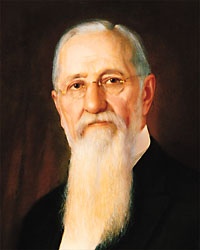 조셉 에프 스미스(1838~1918) 회장은 하나님의 계명을 지키는 사람은
주님께서 지지해 주시고 번영하게 해 주신다고 가르쳤다. “하나님 왕국에
머무는 사람, 이 백성에게 진실된 사람, 세상으로부터 자신을 순수하고
흠없이 지키는 사람이 곧 하나님께서 받아들이실 사람이며, 받들어 주시고
지지해 주실 사람입니다. 그런 사람은 어디에 있든 땅에서 번영하게
됩니다. 그가 자유를 누리든 감방에 감금되어 있든 상관이 없습니다.
다 잘 될 것입니다.”(조셉 에프 스미스, 복음 교리, 238쪽)
조셉 에프 스미스(1838~1918) 회장은 하나님의 계명을 지키는 사람은
주님께서 지지해 주시고 번영하게 해 주신다고 가르쳤다. “하나님 왕국에
머무는 사람, 이 백성에게 진실된 사람, 세상으로부터 자신을 순수하고
흠없이 지키는 사람이 곧 하나님께서 받아들이실 사람이며, 받들어 주시고
지지해 주실 사람입니다. 그런 사람은 어디에 있든 땅에서 번영하게
됩니다. 그가 자유를 누리든 감방에 감금되어 있든 상관이 없습니다.
다 잘 될 것입니다.”(조셉 에프 스미스, 복음 교리, 238쪽)
"20절과 21절에 포함된 약속은 니파이의 신앙, 부지런함 및 겸손으로 인해 왔다. (19절) 그것은 좌우명, 약속 및 니파이의 책임을 표현한다. 그것은 니파이 민족이 번역하거나 멸망하는 데 관련된 중요한 율법이 된다. 이 율법이 너무나 중요하기 때문에 이는 몰몬경에서 적어도 열 번 정도 반복된다. (니전2:20, 니후1:20, 니후4:4, 예이1:9, 모사2:31, 앨9:13, 36:1, 36:30, 37:13, 38:1) 이 약속은 우리 시대에도 여전히 유효하다."
1 Ne 2:20-21 And inasmuch as ye shall keep my commandments… ye shall prosper….
The promise contained in verses 20 and 21 came to Nephi because of his faith, diligence and humility (verse 19). It represents a motto, a promise, and a charge to the Nephites. It becomes the great law by which Nephite nations are prospered or destroyed. This law is so important that it is repeated at least 10 times in the Book of Mormon. (1 Ne 2:20, 2 Ne 1:20, 2 Ne 4:4, Jarom 1:9, Mosiah 2:31, Alma 9:13, 36:1, 36:30, 37:13, 38:1) This promise is still in force in our day.
Spencer W. Kimball
“This America is no ordinary country. It is a choice land, ‘choice above all other lands’ (1 Ne. 2:20). It has a tragic and bloody past, but a glorious and peaceful future if its inhabitants really learn to serve their God. It was consecrated as a land of promise to the people of the Americas, to whom God gave these great promises:
‘It will be a land of liberty to its people’ (2 Ne 1:7).
‘They shall never be brought down into captivity’ (2 Ne 1:7).
‘And there shall be none to molest them’ (2 Ne 1:9).
‘It is a land of promise’ (1 Ne 2:20).
‘It shall be free from all nations under heaven.’
‘There shall be no enemies come into this land.’
‘It shall be free from bondage’ (Ether 2:12).
‘There shall be no kings upon the land’ (2 Ne 10:11).
‘I will fortify this land against all other nations’ (2 Ne 10:11).
‘He that fighteth against Zion shall perish’ (2 Ne 10:13).
“But these promises, glorious though they be, desirable as they are, can come only ‘…if they will but serve the God of this land who is Jesus Christ…’ (Ether 2:12). There is only one way. That infallible cure is simply righteousness, obedience, Godliness, honor, and integrity. There is no other cure. Mountains of arms and ammunitions will not guarantee safety, for enemies can also build fortifications and missiles and bomb shelters. If we would but believe the prophets! For they have warned that if the ‘inhabitants of this land are ever brought down into captivity and enslaved, it shall be because of iniquity; for if iniquity shall abound cursed shall be the land’ (See 2 Ne 1:7).” (Conference Report, Oct. 1961, pp. 30-31 as taken from Latter-day Commentary on the Book of Mormon compiled by K. Douglas Bassett)
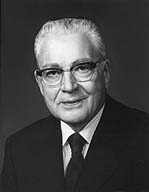 (해롤드 비 리) " 여러분이 다른 사람보다 높은 곳에 서 있을 때 비로소 다른 사람의 영혼을 높이 들어 올릴 수 있습니다. 여러분의 영혼이 불타오르지 않는 다면 여러분은 다른 사람의 영혼에 불을 붙일 수 없습니다." (해롤드 비 리)
(해롤드 비 리) " 여러분이 다른 사람보다 높은 곳에 서 있을 때 비로소 다른 사람의 영혼을 높이 들어 올릴 수 있습니다. 여러분의 영혼이 불타오르지 않는 다면 여러분은 다른 사람의 영혼에 불을 붙일 수 없습니다." (해롤드 비 리)
주) '통치자와 교사' : "목표가 없는 사람은 목표가 있는 사람을 위해 평생 일해야 하는 '종신형'에 처해져 있다."(브라이언 트레이시)
And if it so be that they rebel against me, they shall be a scourge unto thy seed, to stir them up in the ways of remembrance.
주) 그들은 네 자손들에게 채찍이 되어 그들을 깨우쳐 기억하게 하리라 : 본 구절에 대한 휴 니블리의 주석 (영문)
주) '채찍' - 저주와 시련도 다른 사람을 통해 우리에게 다가 오지만, 축복도 하나님께서 다른 사람을 통해 우리에게 주시는 것이다. 하나님과의 관계가 좋은 사람은 하나님께서 친히 사람들의 마음을 움직이시어 축복을 가져다 주게 된다. 반대의 경우도 마찬가지이다.
1 Ne 2:24 they shall be a scourge unto thy seed, to stir them up in the ways of remembrance.
Hugh Nibley
“One thing the reader of the Book of Mormon is never allowed to forget is that the Nephites lived in a polarized world, in which they were perpetually engaged either in hot or cold wars with the Lamanites. Their basic problem was one of survival; security was an obsession with them…the Nephites had by all human standards ample cause for alarm. Yet from the beginning they received full assurance that God had purposely arranged things that way, and that they had absolutely nothing to fear as long as they behaved themselves. God intended that the Nephites should have hostile Lamanites breathing down their necks: ‘I will curse them even with a sore curse, and they shall have no power over thy seed except they shall rebel against me also. And if it so be that they rebel against me, they shall be as a scourge unto thy seed, to stir them up in the ways of remembrance’ ("1 Ne. 2:23"1 Ne. 2:241 Nephi 2:23-24).
“So it was a blessing to the Nephites after all to have the Lamanites on their doorstep to ‘stir them up to remembrance’—‘Happy is the man whom God correcteth’ ("Job 5:17Job 5:17). No matter how wicked and ferocious and depraved the Lamanites might be (and they were that!), no matter by how much they outnumbered the Nephites, darkly closing in on all sides, no matter how insidiously they spied and intrigued and infiltrated and hatched their diabolical plots and breathed their bloody threats and pushed their formidable preparations for all-out war, they were not the Nephite problem. They were merely kept there to remind the Nephites of their real problem, which was to walk uprightly before the Lord.” (Since Cumorah, 2nd ed., pp. 338-9.)